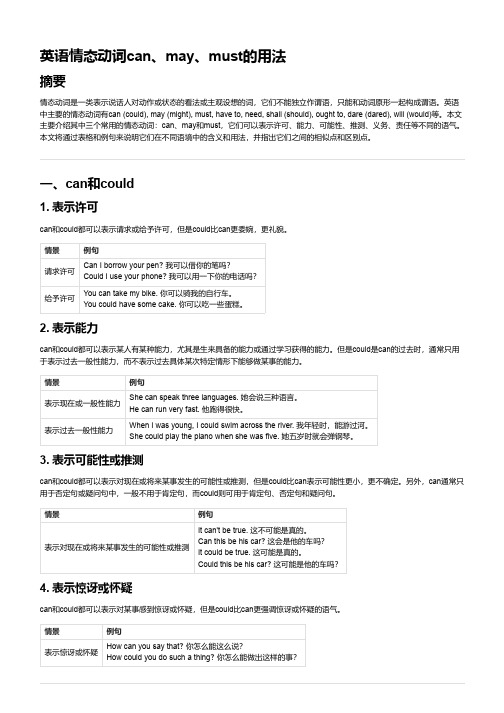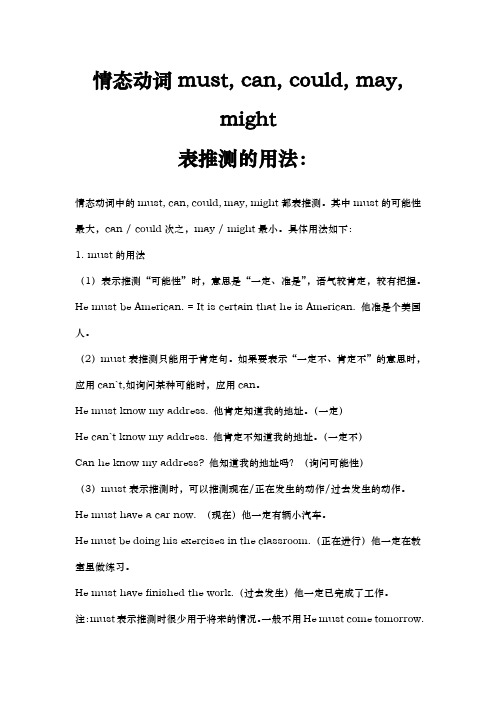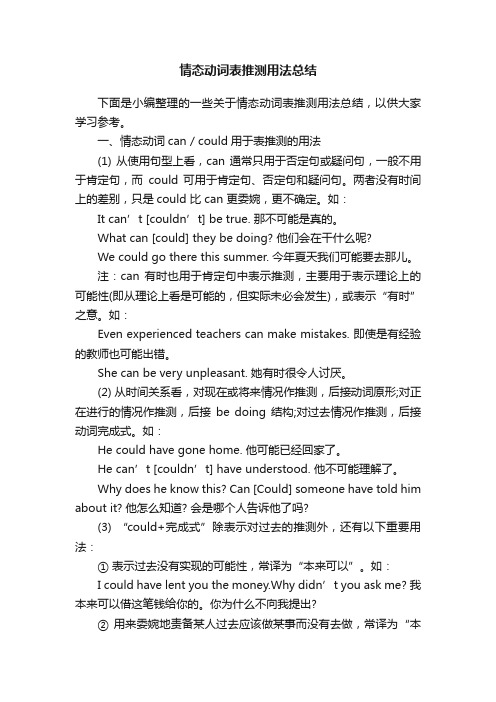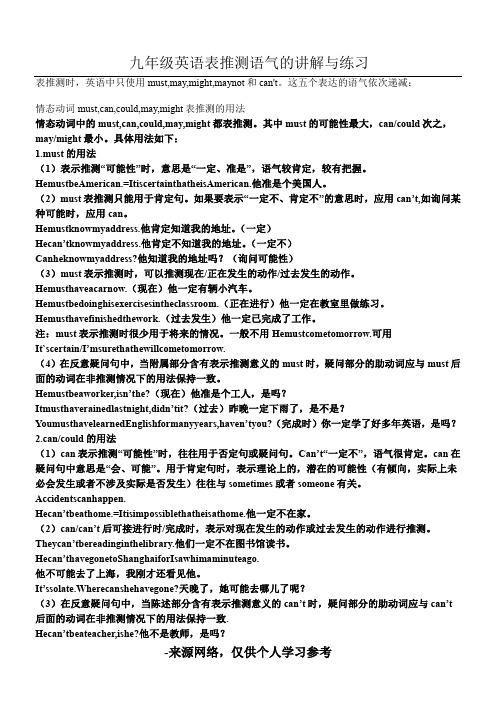情态动词must__can__could__may__might表推测的用法
英语情态动词can、may、must的用法

英语情态动词can、may、must的用法摘要情态动词是一类表示说话人对动作或状态的看法或主观设想的词,它们不能独立作谓语,只能和动词原形一起构成谓语。
英语中主要的情态动词有can (could), may (might), must, have to, need, shall (should), ought to, dare (dared), will (would)等。
本文主要介绍其中三个常用的情态动词:can、may和must,它们可以表示许可、能力、可能性、推测、义务、责任等不同的语气。
本文将通过表格和例句来说明它们在不同语境中的含义和用法,并指出它们之间的相似点和区别点。
一、can和could1. 表示许可can和could都可以表示请求或给予许可,但是could比can更委婉,更礼貌。
情景例句请求许可Can I borrow your pen? 我可以借你的笔吗?Could I use your phone? 我可以用一下你的电话吗?给予许可You can take my bike. 你可以骑我的自行车。
You could have some cake. 你可以吃一些蛋糕。
2. 表示能力can和could都可以表示某人有某种能力,尤其是生来具备的能力或通过学习获得的能力。
但是could是can的过去时,通常只用于表示过去一般性能力,而不表示过去具体某次特定情形下能够做某事的能力。
情景例句表示现在或一般性能力She can speak three languages. 她会说三种语言。
He can run very fast. 他跑得很快。
表示过去一般性能力When I was young, I could swim across the river. 我年轻时,能游过河。
She could play the piano when she was five. 她五岁时就会弹钢琴。
3. 表示可能性或推测can和could都可以表示对现在或将来某事发生的可能性或推测,但是could比can表示可能性更小,更不确定。
情态动词mustcancouldmaymight表推测用法

情态动词must, can, could, may,might表推测的用法:情态动词中的must, can, could, may, might都表推测。
其中must的可能性最大,can / could次之,may / might最小。
具体用法如下:1. must的用法(1)表示推测“可能性”时,意思是“一定、准是”,语气较肯定,较有把握。
He must be American. = It is certain that he is American. 他准是个美国人。
(2)must表推测只能用于肯定句。
如果要表示“一定不、肯定不”的意思时,应用can`t,如询问某种可能时,应用can。
He must know my address. 他肯定知道我的地址。
(一定)He can`t know my address. 他肯定不知道我的地址。
(一定不)Can he know my address? 他知道我的地址吗?(询问可能性)(3)must表示推测时,可以推测现在/正在发生的动作/过去发生的动作。
He must have a car now. (现在)他一定有辆小汽车。
He must be doing his exercises in the classroom.(正在进行)他一定在教室里做练习。
He must have finished the work.(过去发生)他一定已完成了工作。
注:must表示推测时很少用于将来的情况。
一般不用He must come tomorrow.可用It`s certain / I`m sure that he will come tomorrow.(4)在反意疑问句中,当附属部分含有表示推测意义的must时,疑问部分的助动词应与must后面的动词在非推测情况下的用法保持一致。
He must be a worker, isn`t he? (现在)他准时个工人,是吗?It must have rained last night, didn`t it? (过去)昨晚一定下雨了,是不是?You must have learned English for many years, haven`t you? (完成时)你一定学了好多年英语,是吗?2. can / could的用法(1)can表示推测“可能性”时,往往用于否定句或疑问句。
情态动词表推测用法总结

情态动词表推测用法总结下面是小编整理的一些关于情态动词表推测用法总结,以供大家学习参考。
一、情态动词can / could用于表推测的用法(1) 从使用句型上看,can 通常只用于否定句或疑问句,一般不用于肯定句,而could 可用于肯定句、否定句和疑问句。
两者没有时间上的差别,只是could 比 can 更委婉,更不确定。
如:It can’t [couldn’t] be true. 那不可能是真的。
What can [could] they be doing? 他们会在干什么呢?We could go there this summer. 今年夏天我们可能要去那儿。
注:can 有时也用于肯定句中表示推测,主要用于表示理论上的可能性(即从理论上看是可能的,但实际未必会发生),或表示“有时”之意。
如:Even experienced teachers can make mistakes. 即使是有经验的教师也可能出错。
She can be very unpleasant. 她有时很令人讨厌。
(2) 从时间关系看,对现在或将来情况作推测,后接动词原形;对正在进行的情况作推测,后接be doing 结构;对过去情况作推测,后接动词完成式。
如:He could have gone home. 他可能已经回家了。
He can’t [couldn’t] have understood. 他不可能理解了。
Why does he know this? Can [Could] someone have told him about it? 他怎么知道? 会是哪个人告诉他了吗?(3) “could+完成式”除表示对过去的推测外,还有以下重要用法:① 表示过去没有实现的可能性,常译为“本来可以”。
如:I could have lent you the money.Why didn’t you ask me? 我本来可以借这笔钱给你的。
情态动词表推测的用法

情态动词表推测的用法表示推测的情态动词有must, could, may, might, can, should等。
“情态动词+不定式一般式” 表示对现在或将来的推测,“情态动词+不定式进行式”表示对正在进行的动作或事情的推测,“情态动词+不定式完成式”表示对过去的推测。
一、must表示推测的用法must表示推测时,只用于肯定句,表示很大的可能性,意为“一定,准是,必然会”。
其否定形式是can’t/couldn’t (不可能)。
例如:1. You haven’t eaten anything since this morning; you must be hungry.2. That can’t be Mary —she’s in hospital.二、can/could表示推测的用法1. can表示推测时,多用于肯定句和疑问句。
当用于肯定句时,指“有时可能会”,是理论上的可能,其时间意义宽泛不具体。
例如:Even experienced teachers can make mistakes.2. could表示推测时,既可以用于肯定句,又可以用于疑问句。
例如:My book has disappeared. Who could have taken it?3. can’t/couldn’t表示推测时,用于否定句,是语气最强的否定推测,意为“不可能,一定不(是)”。
例如:He can’t/couldn’t have seen her there.4. can/could在疑问句中表示推测时,含有怀疑或疑问的意味,could比can更不确定。
例如:① Can the news be true?② Who can it be?三、may / might表示推测的用法1. may / might表示推测时,用于肯定句,表示无把握的推测,意为“可能,或许”。
(might 比may 更加不肯定,更无把握)。
情态动词表推测的讲解及练习题

九年级英语表推测语气的讲解与练习表推测时,英语中只使用must,may,might,maynot和can't。
这五个表达的语气依次递减:情态动词must,can,could,may,might表推测的用法情态动词中的must,can,could,may,might都表推测。
其中must的可能性最大,can/could次之,may/might最小。
具体用法如下:1.must的用法(1)表示推测“可能性”时,意思是“一定、准是”,语气较肯定,较有把握。
HemustbeAmerican.=ItiscertainthatheisAmerican.他准是个美国人。
(2)如询问某(3)注:(4must后(1)can在(2)can/can’t后可接进行时/完成时,表示对现在发生的动作或过去发生的动作进行推测。
Theycan’tbereadinginthelibrary.他们一定不在图书馆读书。
Hecan’thavegonetoShangh aiforIsawhimaminuteago.他不可能去了上海,我刚才还看见他。
It’ssolate.Wherecanshehavegone?天晚了,她可能去哪儿了呢?(3)在反意疑问句中,当陈述部分含有表示推测意义的can’t时,疑问部分的助动词应与can’t 后面的动词在非推测情况下的用法保持一致.Hecan’tbeateacher,ishe?他不是教师,是吗?Shecan’thavefinishedherhomework,hasshe?她一定没有完成家庭作业,是不是?could可用于表示某事有可能发生表示可能性不大的推测。
意思相当于may/mightDon’teatit.Itcouldbepoisonous.不要吃它,可能有毒。
Theplanecouldbedelayedbyfog.飞机可能会因为雾晚点。
(5)could还可以用于表示客气、委婉、礼貌的请求语气。
情态动词must, can, could, may, might表推测的用法

情态动词must, can, could, may, might表推测的用法:情态动词中的must, can, could, may, might都表推测。
其中must的可能性最大,can / could次之,may / might最小。
具体用法如下:1. must的用法(1)表示推测“可能性”时,意思是“一定、准是”,语气较肯定,较有把握。
He must be American. = It is certain that he is American. 他准是个美国人。
(2)must表推测只能用于肯定句。
如果要表示“一定不、肯定不”的意思时,应用can`t,如询问某种可能时,应用can。
He must know my address. 他肯定知道我的地址。
(一定)He can`t know my address. 他肯定不知道我的地址。
(一定不)Can he know my address? 他知道我的地址吗?(询问可能性)(3)must表示推测时,可以推测现在/正在发生的动作/过去发生的动作。
He must have a car now. (现在)他一定有辆小汽车。
He must be doing his exercises in the classroom.(正在进行)他一定在教室里做练习。
He must have finished the work.(过去发生)他一定已完成了工作。
注:must表示推测时很少用于将来的情况。
一般不用He must come tomorrow.可用It`s certain / I`m sure that he will come tomorrow. (4)在反意疑问句中,当附属部分含有表示推测意义的must时,疑问部分的助动词应与must后面的动词在非推测情况下的用法保持一致。
He must be a worker, isn`t he? (现在)他准时个工人,是吗?It must have rained last night, didn`t it? (过去)昨晚一定下雨了,是不是?You must have learned English for many years, haven`t you? (完成时)你一定学了好多年英语,是吗?2. can / could的用法(1)can表示推测“可能性”时,往往用于否定句或疑问句。
情态动词must、can、could、may、might精解

would :1。
表will的过去,用于过去将来时2。
表"意愿”,乐意做某事3。
虚拟语气could: 1. 表can的过去,表过去的能力2 表请求(婉转语气)3. 表猜测:可能是..。
4. 虚拟语气should:1. 表shall的过去,用于过去将来时,搭配第一人称2。
表婉转的语气:应该做.。
.3。
虚拟语气might:1。
may的过去,表猜测:可能是2. 表许可(婉转语气)may: 1。
表猜测:可能是2。
表许可think of 想起,想到; 没有think from的用法一.shall和will的用法1、shall 用在第一、三人称,will 用于第二人称表示“征求意见”。
Shall I go now?Shall we invite her, too?Will you help me with the work?Shall the reporters wait outside or what?2、shall表示依据规定有义务去做。
Passengers shall not talk with the driver while the bus is moving。
3、shall 用于所有人称,表示说话人的许诺、威胁、警告、命令等。
You shall have an answer by tomorrow。
If he’s good, he shall have a new watch for Christma s.If you children don’t do as I tell you, you shan't go to the party.4、would 可以表示过去的习惯(would 可表示反复发生的动作或某种倾向.used to表示过去的习惯动作或状态,强调现在已不存在)He would come to see me on Sunday when he was here.The dog would lie there in the sun all afternoon.When we were children, we would go skating every winter.5、will可以表示“愿意",而非将来:I will pay you for it. 我会付给你钱买下它的。
情态动词use

情 态 动 词 +have+done” 的 使 用 情 形分析
一、should have done/ should not have done 它们分别表示“过去本来应该(已经) ( 它们分别表示“过去本来应该(已经)…(而实际上并没 过去本不应该( 而实际上却已经…” 有…)”/“过去本不应该(已经)…而实际上却已经 ) 过去本不应该 已经) 而实际上却已经 如:1、We should have studied last night, but we went to 、 the concert instead . 我们昨晚本应学习的,但我们却去看 我们昨晚本应学习的, 音乐会了。 实际上没有学习) 音乐会了。(实际上没有学习) 2、If he had joined us , we should have had a more 、 enjoyable time . 如果他加入我们的活动,我们就可以玩得 如果他加入我们的活动, 更开心了。 实际上没那么开心, 更开心了。(实际上没那么开心,由于他没加入我们的活 动)
(3)在反意疑问句中,当陈述部分含有表示推测意 )在反意疑问句中, 义的can`t时,疑问部分的助动词应与 义的 时 疑问部分的助动词应与can`t后面的 后面的 动词在非推测情况下的用法保持一致 在非推测情况下的用法保持一致. 动词在非推测情况下的用法保持一致 He can`t be a teacher, is he? 他不是教师,是吗? 他不是教师,是吗? She can`t have finished her homework, has she 她 一 定 没 有 完 成 家 庭 作 业 , 是 不 是 ?
He may / might be sleeping now. 现在)他可能正在睡觉。 (现在)他可能正在睡觉。 These students may / might have seen the film before. 过去)这些学生以前可能看过这部电影。 (过去)这些学生以前可能看过这部电影。
表推测的情态动词用法小结

表推测的情态动词用法小结英语中有不少情态动词都可以表示推测,其语气有强有弱,表示的可能性有大有小,情态动词表推测时,可能性由弱到强的排列顺序如下:might→may→could→can→should →would→must“现将它们的用法归纳如下:1. 接近100%的可能这当然只有must才具有这么高的可能性,它的意思是“一定”“肯定”,所作出的推测几乎接近事实。
如:That hat must be Tom’s. 那帽子一定是汤姆的。
He must be coming by bus. 他一定是乘公共汽车来。
2. 很有可能表示可能性较大的情态动词主要有may, should, ought to,它们大致相当于汉语的“可能”“应该”“按理会”。
如:She should [ought to] be here soon. 她应该很快就到。
We may be buying a new house. 我们可能要买一座新房子。
3. 一般性的可能在所有表示推测的情态动词中,might和could所表示的可能性最小,由于它们的语气较委婉,较不确定,所以往往相当于汉语的“可能”“也许”“说不定”等。
如:He might be waiting for you. 他可能在等你。
She might not like the idea. 她或许会不赞成这个想法。
We could all be millionaires one day. 我们有一天可能都成为百万富翁。
4. 理论上的可能性表示理论上的可能通常是用can,且可以用于肯定句中。
如:Food poisoning can cause death. 食物中毒可导致死亡。
This kind of thing can happen every now and then. 这种事情是随时可能发生的。
New England can be very hot in September. 新英格兰有时9月份很热。
初中英语人教新目标九年级全册Unit 8—Unit 14语法知识点总结

九年级英语全册单元语法知识点Unit 8:It must belong to Carla.第八单元的语法重点是:情态动词表推测。
情态动词表推测情态动词 must,may,might,could,may,can 表示推测含义与用法后面都接动词原形,都可以表示对现在情况的揣测和推断但他们含义有所不同。
① must 一定,肯定(100%可能性)② may,might,could 有可能,也许(20%、80%可能性)③ can't 不可能,不会(可能性几乎为零)如:The dictionary must be mine.It has my name on it.The hair band can't be Bob's.After all,he is boy!【直击中考】1.【吉林长春】20.-Are the glasses Tim's?-No,they _______ be his.He doesn't wear glasses.A.mustB.canC.mustn'tD.can't2.【江苏宿迁】5.-Excuse me,is this the way to No.10 Middle School?-Oh,sory.I'm not sure.But it ______ be.A.mustB.shouldC.needD.mayUnit 9:I like music that I can dance to.第九单元的语法重点是:定语从句。
定语从句★定语从句:在复合句中,修饰某一名词或代词的从句叫做定语从句。
定语从句可以分为限制性定语从句和非限制性定语从句。
本单元主要学习由 who、that、which 引导的限制性定语从句。
★先行词:被定语从句所修饰的名词或代词称为先行词。
★关系代词:引导定语从句的关联词称为关系代词。
关系代词在定语从句中有三个作用:(1)引导定语从句;(2)代替先行词;(3)在定语从句中充当一个成分。
情态动词用法

情态动词can, could, may, might, will, would, shall, should, must, can’t 等的用法。
1) can /couldJin can speak English well. (ability)Could you please show me the way to Beihai Park? (request)2) may /mightMay we see the awards for the teams? (permission; request)She might give you some new clothing. (possibility)3) will /wouldThe Spring Festival is the most fun. The whole family will come for dinner. (promise;agreement)Often he would dress up like a rich man. (past habit; custom)4) shall /shouldThe harvest festival begins on Saturday. We shall be there with our friends. (promise;agreement)You should arrive at the airport two hours before he goes. (advice)5) must /can’tWang Feng wins an award every year. He must be very strong (speculation)You must be joking. That can’t be true. (guessing)Teaching procedure:Period 1.Contents: Warming up & reading comprehensionStep 1.Warming upAim: Make students get to know something about water.Step 2. Pre-reading1.Show some pictures of making electricity, irritating in agriculture, transport by ships, etc,.2. group work:How is the water being used?Step 3. While-reading1.Scanning: Ss read scan the bold words in the passage and understand the structure of the passage.How many parts are there in the passage?2.Ss read and get the main ideas of each part.Part 1(para1): the properties of water;Part2(Para2): chemical structure of water---H2OPart3(Para3): salinity----- the percentage of salt.Part4(Para4): DensityPart5(Para5): heat capacityPart6(Para6-7) Ocean motionStep 4. After-readingFinish the post-reading Ex on P21.Step 5. Assignment1. surf the internet and get more information about water and ocean using search engines like yahoo or baidu. ( or just input the key words like Jules Verne into the address column of IE)2. discussion:What will you prepare for writing an explanation of corals?After discussion, work out an outline.Period 2.Contents: difficulties in the passage.Step 1. Warming upAsk some Ss to present their homework.Step 2. Learning about the language:Play the tape for students to follow.Teacher explain some language points in the text on page 19--20.1. Who benefits from using water in this way?Benefit…from/ by…This song reminds me of France.Remind me to answer the letter.I reminded her that the book would cost her much.2. Life in the oceans ranges from the tiniest plankton all the way to giant like sharks andwhales.Range from… to…/ range between …. And…. 意为“从。
情态动词表推测的讲解及练习题

九年级英语表推断语气的解说与练习表推断时,英语中只使用must,may,might,maynot和 can't。
这五个表达的语气挨次递减:神态动词 must,can,could,may,might表推断的用法神态动词中的 must,can,could,may,might都表推断。
此中 must 的可能性最大, can/could次之,may/might 最小。
详细用法以下:1.must的用法(1)表示推断“可能性”时,意思是“必定、准是”,语气较必定,较有掌握。
HemustbeAmerican.=ItiscertainthatheisAmerican他.准是个美国人。
(2)must 表推断只好用于必定句。
假如要表示“必定不、必定不”的意思时,应用 can’t,如咨询某种可能时,应用 can。
Hemustknowmyaddress他.必定知道我的地点。
(必定)Hecan’ tknowmyaddress他.必定不知道我的地点。
(必定不)Canheknowmyaddress?他知道我的地点吗?(咨询可能性)(3) must表示推断时,能够推断此刻/正在发生的动作 /过去发生的动作。
Hemusthaveacarnow(.此刻)他必定有辆小汽车。
Hemustbedoinghisexercisesintheclassroom(正.在进行)他必定在教室里做练习。
Hemusthavefinishedthework(.过去发生)他必定已达成了工作。
注: must表示推断时极少用于未来的状况。
一般不用Hemustcometomorrow可.用It`scertain/I’ msurethathewillcometomorrow.(4)在反意疑问句中,当隶属部分含有表示推断意义的must时,疑问部分的助动词应与must 后面的动词在非推断状况下的用法保持一致。
Hemustbeaworker,isn ’ the?(此刻)他准是个工人,是吗?Itmusthaverainedlastnight,didn(’过tit?去)昨晚必定下雨了,能否是?YoumusthavelearnedEnglishformanyyears,haven’(tyou?达成时)你必定学了很多年英语,是吗?2.can/could的用法(1) can 表示推断“可能性”时,常常用于否认句或疑问句。
初中情态动词表推测的用法及练习(经典)

情态动词表推测的用法(一)情态动词表推测的三种句式(can不肯, may 不问must 肯定不否问)1.在肯定句中一般用must (一定),may(可能),might (也许,或许)。
(1)The photo must be Lu’s, those must be their parents.(2)The policeman may know the way to that school.(3)The notebook may belong to Jim, it’s on his desk.(4)If you have any idea where it might be, please call me.2.否定句中用can’t / couldn’t(不可能), may not/might not(可能不)。
(1)It can’t/couldn’t be the headmaster. He has gone to America.这不可能是校长,他去美国了。
(2)The doctor may not/might not be in the hospital now, It’s nearly six o’clock.3.疑问句中用can/could (能……?)。
(1)Could he have finished the task?他可能把任务完成了吗?(2)Can he be at home now?他现在能在家吗?注:以上三种句式中情态动词的语气按程度都是依次递减的。
might, could并非may, can的过去式,而表示语气较为委婉或可能性较小。
(二)情态动词表推测的三种时态1.对现在正在进行的动作推测时,用“情态动词+ be +doing”。
例:He must / may / might / could be listening to the radio now. 他一定/可能/也许正在听收音机。
情态动词must。can。could。may。might表推测的用法

情态动词must。
can。
could。
may。
might表推测的用法情态动词can / could表示推测时,意思是“可能、有可能”,语气比must弱。
XXX用于现在和将来,could用于过去。
1)表示可能性时,can / could后面接动词原形。
He canbe American。
= It is possible that he is American.他可能是个美国人。
2)表示不可能性时,用XXX。
He can`t be American。
=It is impossible that he is American.他不可能是个美国人。
3)can / could还可以表示“会、能够”的意思。
He can speak Chinese.他会说中文。
4)在疑问句中,XXX表示请求、允许、建议等意义。
Can you help me?你能帮我吗?Could you please pass me the salt?你能把盐递给我吗?3.may / might的用法1)may / might表示推测时,意思是“可能性很小”,语气比can / could更弱。
He may be American。
= It is possible thathe is American。
but the possibility is small.他可能是个美国人,但可能性很小。
2)may / might还可以表示请求、许可、建议等意义。
May I use your phone?我可以用你的电话吗?Might I suggest a different approach?我可以建议一种不同的方法吗?3)在虚拟语气中,XXX表示“可能性很小,甚至不可能”,表示一种假设的情况。
If I had studied harder。
I might have passed the exam.如果我学得更努力,我可能会通过考试。
总之,情态动词must。
情态动词mustcancouldmaymight表推测的用法

情态动词must--can--could--may--might表推测的用法————————————————————————————————作者: ————————————————————————————————日期:ﻩ情态动词must,can, could,may, might表推测的用法:情态动词中的must, can, could, may, might都表推测。
其中must的可能性最大,can / could次之,may / might最小。
具体用法如下: 1. must的用法ﻫ(1)表示推测“可能性”时,意思是“一定、准是”,语气较肯定,较有把握。
He mustbe American. =It is certain that he is Ameri can.他准是个美国人。
(2)must表推测只能用于肯定句。
如果要表示“一定不、肯定不”的意思时,应用can`t,如询问某种可能时,应用can。
He must knowmy address. 他肯定知道我的地址。
(一定)ﻫHe ca n`tknow my address.他肯定不知道我的地址。
(一定不)Can he know my address? 他知道我的地址吗?(询问可能性)ﻫ(3)must 表示推测时,可以推测现在/正在发生的动作/过去发生的动作。
ﻫHe musthave a car now. (现在)他一定有辆小汽车。
He must be doing his exercisesinthe classroom.(正在进行)他一定在教室里做练习。
ﻫHe must have finished the work.(过去发生)他一定已完成了工作。
ﻫ注:must表示推测时很少用于将来的情况。
一般不用He must come tomorrow.可用It`scer tain / I`m sure that he will come tomorrow.ﻫ(4)在反意疑问句中,当附属部分含有表示推测意义的must时,疑问部分的助动词应与must后面的动词在非推测情况下的用法保持一致。
表推测的情态动词

3. “can/could not +have +done”“过 去 不可能做了某事” 她不能去你家,她不知道你的地址。 eg. She can not have been to your house;she does not know your address.
4. may/might have done“过去或许做 过某事” may/might not have done “过去或 许 没有做过某事” eg. I can’t find my key, I might have left it at home. He might not have got your letter.
二.“情态动词+have done” 的用法。 1.must have done “过去一定做了某事” 表示对过去的一种肯定性推测。 eg. She must have gone by bus. It must have rained last night, for the road is quite muddy.
2. can/could have+done“过去可能 做了某事”, “could have+done”也可表示‘‘过 去本可以做某事但实际上却没有做” eg. He was not at home last night, he could have gone to the cinema. I could have finished my homework last night, but I was too sleepy.
5.ought to/should have done,”表示本应该 做某事,而事实上并没有做”。 否定句表示“ 本不该做某事而实际上做 了”。 你在实验中本应该更仔细些的 You ought to/should have been more careful in this experiment. 他不应该把那些旧衣服扔了。 He ought not to have thrown the old clothes away.
情态动词表推测

1. --Are you coming to Tom’s party ?--I’m not sure .I ________ go to the concert instead A. must B. would C. should D. might2. Peter ______come with us tonight, but he isn’t very sure.A. mustB. mayC. canD. will3. Hurry up, our teacher _____for us at the school gate.A. must be waitingB. must waitC. might waitD. can be waiting4. You have done so much work, you __________ rather tired.A. must be feelingB. could be feltC. may be feelingD. would feel5. She doesn't answer the doorbell, she _____ be asleep.A. canB. mightC. must haveD. should6. Naturally, after I told her what to do, my daughter ______ go and do the opposite!A. mayB. canC. mustD. should7.-- Is there a flight to Paris this evening?--There _______be. I’ll phone the airport and find it out.A. mustB. wouldC. mightD. can8. ---I’ve taken someone else’s green sweater by mistake.---It______ Harry’s. He always wears green.A. has to beB. wi ll beC. mustn’tD. could be9.Very loud noises __________ make people ill, hurt their ears or even drive them mad.A. mustB. needC. canD. should10. Even experienced teachers ________ make mistakes.A. mustB. canC. shouldD. might11.The temperature______ sometimes reach 35℃ in July.A. mustB. shallC. shouldD. can12.Too much love ________ sometimes be bad.A. mustB. shallC. shouldD. can13.Sometimes he is very friendly, but at other times he ____ behave coldly.A. canB. mustC. willD. shall.(二)(否定句式)1. Mr. Li _____be in Beijing because I saw him in town only a few minutes ago.A. needn'tB. can'tC. shouldn'tD. mustn't2. It _____be Li Ming who took my dictionary away.It be Zhang Hua who did it.A. can't;mustB. mustn't;mustC. needn't;canD. may not;can3. ---- Is John coming by train?---He should, but he _______ not. He likes driving his car.A. mustB. canC. needD. may4. ---I heard they went skating in the mountains last winter.---- It _____ true because there was little snow there.A. may not beB. won't beC. couldn't beD. mustn't be5. It _____ be she that told him about it; it ____ be you, because only you and I know it.A. mustn’t; mustB. couldn’t ; mustC. mustn’t mightD. couldn’t; might6. A hardworking man _____ become a great scientist, but a great scientist ____ be a hardworking man.A. can’t; canB. may not; canC. can’t; mustD. may not; must7. You ______ be tired; you have been working for so long a time, but he _______ be tired;he has just begun to work.A. may not; mustB. must; may notC. can’t; mustD. must; can’t8. --- Isn’t that Ann’s husband ove r there?--- No, it ______ be him---I’m sure he doesn’t wear glasses.A. can’tB. must notC. won’tD. may not(三)(疑问句式)1. --- Someone is knocking at the door. Who it be?--- It be Tom. He is still in the school.A. can, can'tB. can, mustn'tC. might, couldD. might, may2. _______it be true that Albert passed the test in geography?A. MayB. ShouldC. CouldD. Would3. Mr. Bush is on time for everything. How ____ it be that he was late for the opening ceremony?A. canB. shouldC. mayD. must4.How ____ you say that you really understand the whole story if you have covered onlypart of the article?A. canB. mustC. needD. may5. My English-Chinese dictionary has disappeared . Who ________ have taken it ?A. shouldB. mustC. couldD. would6.I can’t find Dr. Lopez anywhere in the office building. Where _______ he have gone ?A. mustB. canC. shouldD. need7. See who is there! ______ it be May?A. MayB. MustC. CanD. Will(四)(should表猜测)1. It’s nearly seven o’clock . Jack _______ be here at any moment .A . must B. need C. should D. can2.--- When can I come for the photos? I need them tomorrow afternoon.---They __________ be ready by 12:00.A. canB. shouldC. mightD. need3.There______be any difficulty about passing the driving test since you have practised a lot in the driving schoolA mustn'tB shan'tC shouldn'tD needn't4.It’s said that there are plenty of hotels in that town. There ___ be any difficulty for you to find somewhere to stay.A. wouldn’tB. mustn’tC. shouldn’tD. needn’t(五)(表推测的情态动词+have done)1. John's score on the test is the highest in the class; he____ last night.A) should study B) should have studiedC) must have studied D) must have to study2. The room is in a terrible mess; it ____cleaned.A) can't have been B) shouldn't have beenC) mustn't have been D) wouldn't have been3. Nobody knows how people first came to these islands. They ____ from South America on rafts.A) must have sailed B) can sail C) might have sailed D) should have sailed4. Mary was not in her bedroom yesterday afternoon. She ____ in her classroom.A) should have been B) must have been C) must be D) should be5.She can speak quite fluent English. She____.A) must be in the U.S.A. for some time B) must have been in the U.S.A. for some timeC) should have been in the U.S.A. for some time D) may be in the U.S.A. for some time6. Mary ____my letter, otherwise she would have replied before now.A) should have received B) has receivedC) couldn't have received D) ought to have received7.Jack __________yet, otherwise he would have telephoned me .A. mustn’t have arrivedB. shouldn’t have arrivedC. can’t have arrivedD. needn’t have arrived8.---“Where ____ my umbrella?” ---“Somebody ____ it away by mistake.”A) is, must have taken B) is, must take C) have been, must take D) is, takes9. He ____the 9:20 train because he didn't leave home till 9:25.A) can reach B) could catch C) may not catch D) couldn't have caught10. --- The woman biologist stayed in Africa studying wild animals for 13 years before she returned.--- Oh, dear! She _______ a lot of difficulties!A. may go throughB. might go throughC. ought to have gone throughD. must have gone through11.---Tom is never late for work. Why is he absent today ?---Something ______to him.A. must happenB. should have happenedC. could have happenedD. must have happened12.Where is my pen ? I ___________it .A. might loseB. would have lostC. should have lostD. must have lost13. I didn't see her in the meeting-room this morning. She at the meeting.A. mustn't have spokenB. shouldn't have spokenC. needn't have spokenD. couldn't have spoken14.We didn't see Tom at the meeting yesterday. He it.A. mustn't have attendedB. cannot have attendedC. needn't have attendedD. would have not attended15. ---What has happened to George ?---I don't know. He _____ lost.A. can have gotB. may have go tC. might getD. could get16. The streets are all wet;It _____ rained heavily last night.A. shouldB. should haveC. mustD. must have17. ---There were already five people in the car but they managed to take me as well.---It __________ a comfortable journey.A. c an’t beB. shouldn’t beC. m ustn’t have beenD. couldn’t have been18. Sorry I’m late, I _______turned off the alarm clock and gone back to sleep again.A. might have turnedB. should have turnedC. can turnD. will turn19. He left yesterday, so he __________ in Beijing.A. may arriveB. may have arrivedC. must arriveD. arrives(六)(表猜测的反意疑问句)1. He must have finished the work, _____ he?A .mustn’t B.needn’t C. hasn’t D. didn’t2. He must have finished the work two years ago, _______he?A .mustn’t B.needn’t C.hasn’t D. didn’t3. He must be a student, _____ he?A .mustn’t B.needn’t C. hasn’t D. isn’t4. He must have been scolded by his father last night, ______?A. mustn’t heB. haven’t heC. wasn’t heD. didn’t he5. Tom must have learned Chinese for several years,_____ he?B. hasn't D. don't6. He can’t be her father, _____ he? A. is B. isn’t C. can D. can’t7. Mr Smith ca n’t have solved all his problem,_____?A. can heB. can’t heC. hasn’t heD. has he。
情态动词can、may、might的用法

情态动词表示猜测时语气从强到弱的顺序是:must,will,would,can,may,could,might.〔5〕用于表目的或让步状语从句中。
She was studying English so that she might 英语,以便能阅读英代书籍。
He died in order that others might live. 他为了别人而牺牲了。
1. 表示请求、建议等,would更委婉。
Will / Would you pass me the ball, please?2. 表示意志、愿望和决心。
I will never do that again. They asked him if he would go abroad.3.表示过去反复发生的动作或某种倾向。
would表示过去习惯时比used to正式,且没有“现已无此习惯”的含义。
During the vacation, he would visit me every other day.4.表示估计和猜想。
It would be about ten o’clock when she left home.二、may、might表示允许(1) 表示请求允许(即请求别人允许自己做某事),两者都可用,只是might 表示的语气较委婉(不表示过去):may 的否认形式为may not,但表示“不可以”、“阻止”等意思时常用must not(musn't)代替may notMay /Might I come round in the morning? 我早上来可以吗?I asked her if I might /may call and see her. 我问她我可否来看她。
(2) 表示给予允许(即自己允许别人做某事),通常要用may而不用might:You may leave whenever you please. 你高兴随时可以走。
- 1、下载文档前请自行甄别文档内容的完整性,平台不提供额外的编辑、内容补充、找答案等附加服务。
- 2、"仅部分预览"的文档,不可在线预览部分如存在完整性等问题,可反馈申请退款(可完整预览的文档不适用该条件!)。
- 3、如文档侵犯您的权益,请联系客服反馈,我们会尽快为您处理(人工客服工作时间:9:00-18:30)。
情态动词must, can, could, may, might表推测的用法:情态动词中的must, can, could, may, might都表推测。
其中must的可能性最大,can / could 次之,may / might最小。
具体用法如下:1. must的用法(1)表示推测“可能性”时,意思是“一定、准是”,语气较肯定,较有把握。
He must be American. = It is certain that he is American. 他准是个美国人。
(2)must表推测只能用于肯定句。
如果要表示“一定不、肯定不”的意思时,应用can`t,如询问某种可能时,应用can。
He must know my address. 他肯定知道我的地址。
(一定)He can`t know my address. 他肯定不知道我的地址。
(一定不)Can he know my address? 他知道我的地址吗?(询问可能性)(3)must表示推测时,可以推测现在/正在发生的动作/过去发生的动作。
He must have a car now. (现在)他一定有辆小汽车。
He must be doing his exercises in the classroom.(正在进行)他一定在教室里做练习。
He must have finished the work.(过去发生)他一定已完成了工作。
注:must表示推测时很少用于将来的情况。
一般不用He must come tomorrow.可用It`s certain / I`m sure that he will come tomorrow.(4)在反意疑问句中,当附属部分含有表示推测意义的must时,疑问部分的助动词应与must后面的动词在非推测情况下的用法保持一致。
He must be a worker, isn`t he? (现在)他准时个工人,是吗?It must have rained last night, didn`t it? (过去)昨晚一定下雨了,是不是?You must have learned English for many years, haven`t you? (完成时)你一定学了好多年英语,是吗?2. can / could的用法(1)can表示推测“可能性”时,往往用于否定句或疑问句。
Can`t“一定不”,语气很肯定。
can在疑问句中意思是“会、可能”。
He can`t be at home. = It is impossible that he is at home. 他一定不在家。
(2)can /can`t后可接进行时/完成时,表示对现在发生的动作或过去发生的动作进行推测。
They can`t be reading in the library. 他们一定不在图书馆读书。
He can`t have gone to Shanghai for I saw him a minute ago.他不可能去了上海,我刚才还看见他。
It`s so late. Where can she have gone? 天晚了,她可能去哪儿了呢?(3)在反意疑问句中,当陈述部分含有表示推测意义的can`t时,疑问部分的助动词应与can`t后面的动词在非推测情况下的用法保持一致.He can`t be a teacher, is he? 他不是教师,是吗?She can`t have finished her homework, has she?她一定没有完成家庭作业,是不是?(4)could可用于表示某事有可能发生或可能是事实。
Don`t eat it. It could be poisonous. 不要吃它,可能有毒。
The plane could be delayed by fog. 飞机可能会因为雾晚点。
(5)could还可以用于表示客气、委婉、礼貌的请求语气。
Excuse me, could you tell me the way to the bus station?Could you help me?(6)couldn`t表示否定推测,表示某事不可能真实,或由于特定事实或环境某事肯定不会发生。
It couldn`t possibly be poison. 这不可能是毒药。
注:有时与形容词的比较级连用强调某人或某物不可能再更多地具有某种属性。
You couldn`t be more wrong. 你真是大错特错。
I couldn`t be happier. 我简直是幸福极了。
3. may和might的用法(1) may, might表示推测“可能性”时,意思是“可能”、“也许”,语气没有must肯定。
He may / might be American. = It is possible that he is American.他可能是个美国人。
注:might不表示过去时态,只是语气上比may更委婉,表示的可能性更小。
(2)may, might表推测时,可以用于否定句,意思是“可能不、也许不”,但不用于疑问句。
He may / might not be at home. 他也许不在家。
(3)may, might可以推测现在正在发生的动作或过去发生的动作。
He may / might be sleeping now. (现在)他可能正在睡觉。
The boy may / might not be watching TV at home. (现在)这个男孩可能没在家看电视These students may / might have seen the film before.(过去)这些学生以前可能看过这部电影。
(4)may, might还可以推测将来的情况。
I think we should take raincoat with us, it may rain.我想我们应该带上雨衣,可能要下雨了。
She might not come this afternoon. 她今天下午可能不来了。
although与though的区别和用法一、用作连词表示“虽然”,两者大致同义,可换用,只是although 比though 更为正式:Though [Although] it was raining,we went there. 虽然下着雨,但我们还是去了那儿。
Though [Although] it was barely four o’clock, the lights were already on. 尽管才四点钟,灯已经亮了。
Though [Although] we are poor, we are still happy. 我们虽然穷,仍然很快活。
二、用作副词although 一般不用作副词,而though 可用作副词,且一般放在句末(不放在句首),意为“可是”、“不过”:It’s hard work; I enjoy it though. 工作很辛苦,可是我乐意干。
He is looking fit, though. 但他看起来很健康。
You can count on him, though. 不过你可以指靠他。
三、用于习语在as though(好像,仿佛),even though(即使,纵然)等固定短语中不能用although:She closed her eyes as though she were tired. 她闭上眼,仿佛很疲劳似的。
We felt as though we had witnessed the whole thing. 我们感到仿佛目击了整个这件事似的。
He is an honest man, I must say, even though I have opposed him. 尽管我反对过他,我还得说他是一个诚实的人。
She was always afraid of men, even though she had lots of boyfriends.尽管她有很多男朋友,她总是害怕男人。
四、用于倒装though 引导的让步状语从句可用部分倒装的形式(注意:倒装后位于句首的名词之前不用冠词),但although 一般不这样用:Poor though I am, I can afford it. 我虽穷,但这东西还是买得起的。
Child though he was, he did quite well. 他虽是孩子,但干得很好。
despite,in spite of的区别和用法Despite用作介词时,与in spite of同义,都表示“尽管”、“虽然”、“不顾”之意,但程度有所不同。
一般说来,in spite of的语气较强,使用范围也较广; despite的语气较弱,多用于诗歌或正式的文体中。
Despite可以写作despite of,也可以写作in despite of;in spite of则可以写作spite of,但这些写法已少用了。
例:Despite his advanced years,he is learning to drive.虽然年事已高,他现在在学驾驶汽车。
Despite the drought,we expect a good crop.尽管天旱,丰收依然在望。
In spite of the police brandishing their clubs and pistols,people showed not the slightest fear.尽管警方挥动着短棍及手枪,但人们毫不畏惧。
We arrived at the station in spite of the storm.虽然有暴风雨,我们依旧准点到达火车站。
应当在此指出的是,在现代英语里,despite和in spite of的差距已日渐缩小,很多人已将它们互换使用。
Despite除作介词外,尚可用作名词,表示“蔑视”、“憎恨”、“无意对待”之意。
例:The old woman died of despite.那位老大娘饮恨而死。
He tripped me out of despite,not by accident.他绊倒我是出于恶意,不是出于意外。
在上列两句中,despite用作名词,它亦可改写为spite。
